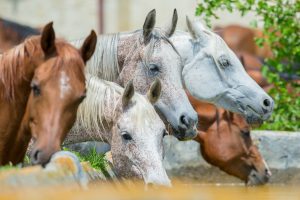
Horses have evolved as herd animals, so will trade off exclusive access to resources like food, water, shelter and mates for safety in numbers © Can Stock Photo / Melory
In reality, dominant behavior in the world of the horse is a way of gaining and maintaining access to valuable resources without breaking the elastic connection between herd members. It is a way of reducing the risk of injury and lowering the stress — and, according to Linklater et al. (1999), the resultant impact on health — of constant aggression.
A horse who is very thirsty may use a dominance display to gain preferential access to a water hole. But that’s it. He gains access, he drinks and he leaves. He will not remain to guard that water against all incomers, because by doing so, he loses access to friends, mates and food. Nor will a horse guard access to grazing or browsing, because by being on guard and using aggression, he will use up valuable energy he hopes to obtain from the food.
(Issue 45, November 2020, pp.50-51). Read article
